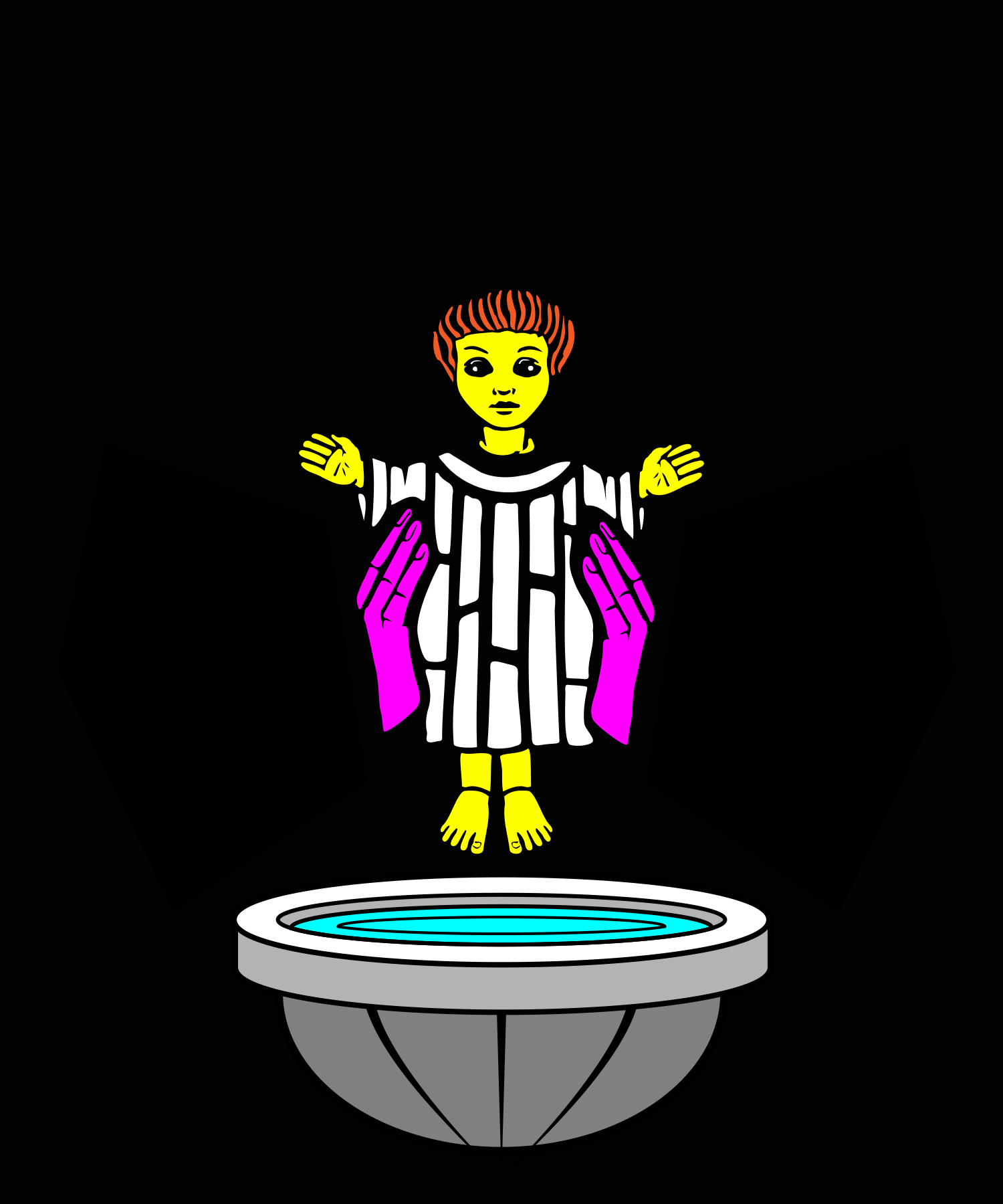Do you believe in infant baptism or believers’ baptism? Do you even know the language and why it matters? If you are part of a local church which practises one or the other, or indeed neither, then knowing where the church stands and what you think about it will be important, especially if you are a youth or children’s worker who grew up in a different tradition. Gareth Crispin knows both worlds well and draws out what it’s about, why it matters and asks some significant questions.

These days the question of whether or not we should baptise infants seems to rank alongside whether or not we should dunk biscuits in tea: we might have a view, but it’s not seen as very important and most of us haven’t spent much time thinking about it. Well apart from the committed few!
Of course, at various times in church history the opposite was true. That’s why we have Baptist denominations; churches split in the past over this very issue. While this might appear to have been an extreme reaction – overplaying the importance of a disagreement – have we gone too far the other way these days? Have we underplayed the significance of the question? Do we need to think more about this today?
To answer this question, we’ll start with some of the words and definitions people use, then take a brief look at why people take different views and end by thinking about the significance of all this for our day-to-day mission and ministry among young people, children and families.
The problem of words
In essence, we want to know the difference between those that think we should baptise babies and those that think we should only baptise people once they can speak, think for themselves and make an independent decision.
It can be a bit frustrating when this second group are called Baptists because we’re all Baptists really, the question is: what sort of Baptist are you? (Just for clarity, we’re only thinking about Protestant positions here. The Roman Catholic position on baptising children is altogether a different question that we don’t have space to address in this article.)
When I was at theological college lots of students persisted with the term ‘paedo-baptists’ to describe people that felt we should baptise babies. I tried to explain how this was not a particularly good phrase, not least because of how it might be heard in today’s society, but there was no persuading some people! Instead, let’s go for the phrase ‘infant-baptist’ for this position.
Equally frustrating, I then heard people talking about ‘credo-baptists’ to talk about those that felt we should only baptise people once they can speak, think for themselves and make an independent decision.
I tried to suggest that using Latin wasn’t the best way to talk to most people (‘credo’ is Latin for believe). But again, some were not to be persuaded. Instead, let’s go for ‘believer-baptist’ for this position. I know this is not ideal because infant-baptists will baptise people ‘as believers’ if they haven’t already been baptised as children, but it’s the best phrase I have heard so we’ll go with it for now.
Why do people believe what they believe?
Inevitably I’m going to massively generalise and simplify what is a complicated picture. But for the sake of this piece we’ll think about how infant-baptists look at this question from the big picture of the whole of the Bible and its major storylines, whereas believer-baptists look at it from the smaller, more detailed stories of the New Testament only.
Believer-baptists
Believer-baptists approach this question through a detailed focus on the New Testament. In essence, the argument goes like this: we are Christians, therefore we live in accordance with the New Testament first and foremost.
If God wanted us to baptise infants, we would see a positive command in the New Testament that tells us to do that. We don’t see a positive command in the New Testament to baptise infants therefore we should not do it.
Any argument that children are included in the baptisms of the New Testament (eg when ‘whole households’ are baptised as in Acts 16:15) is an ‘argument from silence’ (meaning you have to infer something from the silence, so you’ve not really got any firm evidence at all) and so is not at all convincing.
“What is your view of baptism? And what does that say about your underlying view of the child?”
Infant-baptists
Infant-baptists approach the whole issue the other way around focusing on the continuity between the Old and New Testaments. There are a number of arguments that are made but in essence the main argument goes like this: we are the people of God, the new Israel. While the incarnation of Jesus Christ changed things radically, that change only makes sense in direct relationship to all that came before.
The people of God in the past had a sign that they were God’s people, that ‘sign of the covenant’ was circumcision. After Jesus Christ, the ‘sign of the covenant’ became baptism. There is nothing in the New Testament that says the Church should stop applying the sign of the covenant to infants. You should continue to do things until God tells you not to, therefore, we should be applying the sign of the covenant to our children today – in other words, we should baptise them.
Does historical context matter here?
While we might think that we decide what we should do and believe purely on the basis of the strength of the arguments, a brief examination of history shows us that our decisions might not always been so pure. Generally speaking, for most of history, the Church has baptised infants.
The main believer-baptist movement started in the 1500s as part of the wider Reformation (you know, Martin Luther and all that). Part of the Reformation was a movement towards the individual. The individual should have the Bible in their own hands in their own language. As that idea progressed it is perhaps not surprising that a focus on the decision of the individual became seen as more important.
This focus on the individual has only accelerated and strengthened in the last 500 years, so it is perhaps also unsurprising that the believer-baptist position is now far and away the most popular Protestant view. While the infant-baptist position is mostly concerned with God’s action, the believer-baptist view focuses much more on the human decision – an altogether more popular thing in our contemporary age!
So what? Isn’t this just about as important as dunking biscuits?
In many ways we could argue that whether people baptise infants or not is irrelevant to mission and ministry to and with children and youth today – a bit like dunking biscuits. Apart from Catholics and a small minority of Protestants, people don’t believe that baptism actually does anything to change the state of the person, it is merely a sign. In response we might say: “Well it’s a sign that Jesus told us to use so we should.” But even so, is that all there is to say?
Well no, there is more to say. What we think about baptism is important mostly because of what it says about our underlying mission and ministry, especially our evangelism and discipleship. Let me explain by first asking you a question: should you teach the children in your family or church the Lord’s prayer?
I used to work for a Baptist church and I was once in a planning meeting for our 11 to 14s group and we were talking about doing a series on prayer when one of our leaders said: “Why are we thinking about teaching them to pray ‘Our father’ when they are not Christians?”
This crystalises the issue. In many ways this isn’t about whether we baptise or not, it’s about how we view the youth and children in our families and churches. Infant-baptists see infants as ‘in’ the covenant of faith until they demonstrate that they are ‘out’, but the believer-baptist position is that infants are ‘out’ until they decide to come in. This has significant implications for our mission and ministry, especially in terms of evangelism and discipleship.
Now of course, none of us are totally consistent in our beliefs and actions and I have always found it interesting that parents in infant-baptist churches are mostly believer-baptist (I used to work in an Anglican church too!), but let’s not worry too much about that now.
The point of this piece is not to persuade you of a particular view of baptism (though of course you should think about that too). The point of this piece is to help us think through what we believe and why and what the implications are for our mission and ministry. So with all that in mind, here’s some things for you and your church to think about.
All churches
What is your view of baptism? And what does that say about your underlying view of the child? Are they a member of the covenant and the Church as they are or do we wait to see a conversion moment or confession of faith?
Infant-baptist churches
- Does your church consistently support the infant-baptist view in church practices and the way in which it supports parents? For example:
- Do you continually have ‘altar calls’ and / or focus on conversion stories of young people that might unconsciously undermine the idea that young people and children are ‘in’ until they demonstrate they are ‘out’?
- Do you allow access to communion for children? If not, why not? Some would say that if you apply the ‘covenant sign’ to children you should not exclude them from the ‘covenant meal’. Others would say that communion requires confession of known sin which very young children cannot do. Denominations have different rules on this so you might need to ask about that specifically.
- Do you practise confirmation? How does the way in which you do confirmation match the message you want to communicate? Does it undermine the place and importance of baptism in anyway? For example, in the Anglican Church does the fact that the vicar baptises children but the bishop confirms them suggest more value is placed on confirmation than baptism? Or can confirmation support and bolster infant baptism in anyway?
- What does your support for parents look like? If you do parenting courses, are they written from an infant-baptist perspective? And what about other parenting and family Bible reading resources – are they coming from an infant-baptist view?
- At what age is confirmation appropriate? Often churches look to confirm at about 14, but why? Lots of young people go on to change their mind after their teenage years, so is 14 too young? Or in fact does it mean that you should feel free to confirm children as young as six?
- Do you want to create anything else for a child or young person who wants to mark their faith journey in some way (but they were baptised as a child)? Does that entail creating your own rites of passage for your church (for example, marking the move between being a child and being an adolescent and also the move into adulthood)?
- How does your church interact with people from the wider community that want their children christened (as in, they are not Christian and are essentially looking for a naming ceremony)? Do you encourage them to have a service of thanksgiving instead?
Believer-baptist churches
- What does your position as a believer-baptist church mean for how your church works with children and young people? Does it mean that you don’t treat children and young people as Christians until they have been baptised? For example:
- Do you teach them to pray ‘our Father’ or not?
- What do you teach them? If they are seen as non-Christians do you teach a ‘basic gospel’ until they confess faith in Christ and after that point you teach them ‘the whole counsel of God’?
- Are parenting resources and courses coming from a believer-baptist viewpoint?
- At what age is baptism appropriate? Often churches look to baptise at about 14, but why? Lots of young people go on to change their mind, so is 14 too young? Or in fact does it mean that you should feel free to baptise six-year-olds (does that one sound familiar?)?
- How do you welcome young people and children that were baptised as children and don’t see any need to be baptised again? Is there any flexibility in the membership requirements?
- How do you celebrate the birth of a child? Is there room for a significant emphasis on dedication and thanksgiving?
- If you have the word ‘baptist’ in the title of your church, how do you feel about that? Is it such an essential belief that it merits being part of the name of your church?











































